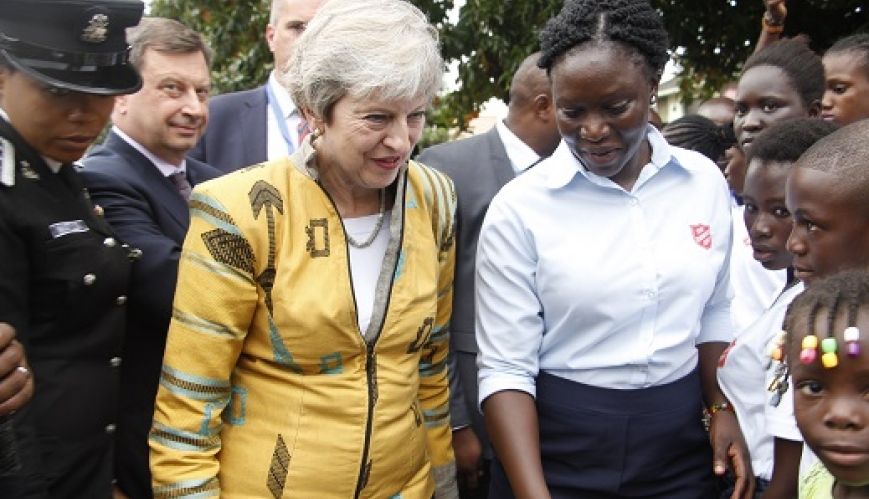British PM visits anti-slavery project in Nigeria

British PM visits anti-slavery project in Nigeria
3 September 2018
British Prime Minister Teresa May with Paska Moore, Project Manager for the CAR project in Nigeria and Philippines, during her visit last week.
British Prime Minister, Theresa May, visited a Salvation Army project in Nigeria last week to see how a program designed to combat modern slavery is making an impact on the central African nation.
The Prime Minister, on a three-day diplomatic trip to Africa, was eager to learn more about The Salvation Army project that supports people within Nigerian communities who are vulnerable to human trafficking or who have survived this form of exploitation.
At a Salvation Army centre in Lagos, the Prime Minister met staff and volunteers from the community as well as survivors of human trafficking and their families who have been supported by The Salvation Army’s innovative community awareness and recovery (CAR) project, which is funded by the Modern Slavery Innovation Fund (administered by the Home Office).
The Salvation Army’s Anti Trafficking and Modern Slavery unit in the United Kingdom has supported nearly 650 people from Nigeria who have been trafficked to England and Wales since 2011.
Nigeria features consistently in the top 10 countries from which people are trafficked to the UK, forced into modern slavery and have received specialist support from The Salvation Army through its government contract.
The CAR project, which is one of a range of in-country programs around the world supported by a specialist international team from The Salvation Army in the UK, runs across four states in Nigeria and the island of Mindinao in the Philippines.
It focuses on changing community attitudes and behaviours towards trafficking and offers care and accommodation with specially trained host families. The project also links people to long-term community reintegration and support programs run through Salvation Army churches and centres.
New approaches
In partnership with the Home Office, The Salvation Army is piloting new approaches to transforming the lives of people susceptible to trafficking or recovering from exploitation.
The project moves away from shelters and institutions, favouring traditional African responses of providing support within family and community settings, with a focus on empowering communities to care for their own vulnerable people in the long term and empowering survivors to develop sustainable self-reliance to reduce the risk of retrafficking.
To date the CAR project has received more than 100 referrals and more than 50 survivors have been supported with recovery and rehabilitation services while capacity continues to be built to meet the continuous growth in demand.
In Nigeria, most referrals were for adult women who were victims of sexual exploitation, although some were children, some men and some trafficked for domestic servitude and forced labour.
Kathy Betteridge, the Director of Anti Trafficking and Modern Slavery for The Salvation Army in the UK, said: “The Salvation Army has made responding to modern slavery and human trafficking a global priority, building on our long history of working with people affected by this horrendous crime. We are therefore honoured that the Prime Minister has chosen to visit our project in Nigeria.
“We also welcome the Prime Minister’s announcement today of new measures to cut illegal and unsafe migration and provide support for victims of modern slavery in West Africa. We have been grateful for the support, which has enabled The Salvation Army to complete the foundations to get this innovative project up and running and already generating really positive outcomes for the community. We hope for backing into the future to enable us to continue building in the long-term on the remarkable successes of this project so far.”
Integrated response
The CAR project is part of The Salvation Army’s wide-ranging, integrated response to modern slavery, which aims to secure the best outcomes for the people affected. The church and charity works closely with its UK team and partners in Nigeria, including the National Agency for the Prohibition of Trafficking in People, government ministries and other faith-based and civil society organisations to share best practice.
Project Manager for the CAR project in Nigeria and Philippines, Paska Moore, said: “It was a privilege to introduce the Prime Minister, as a long-term champion of the fight against trafficking, to the people whose communities The Salvation Army has been able to support through the CAR project.
“She was able to see first-hand the impact of UK Government funding on people vulnerable to trafficking whose lives have been transformed by this project which draws on our expertise in this field and strong community networks across Nigeria.
“She also met some individuals who spoke frankly of the terrible exploitation they have endured and how, now they are successfully reintegrating into their communities, they can face the future with renewed hope.”
Global priority
The Salvation Army is present in 131 countries and has made responding to modern slavery and human trafficking a global priority.
From the UK it provides financial and technical support to 11 anti-trafficking projects around the world, including a recovery centre for child victims in Malawi, a community and recovery program in India, an employment verification and job support program in Poland and a social enterprise cafe in Kathmandu, Nepal.
The Salvation Army in the UK and Nigeria are working with their counterparts globally, as well as other organisations engaged in tackling modern slavery, to build a networked response, developing and sharing best practice, which can lead to better prevention and improved support for those affected by human trafficking.
To donate securely online, click here.
This article first appeared at https://www.salvationarmy.org.uk/theresa-may-visits-salvation-army-modern-slavery-project-nigeria
+ video at IHQ site